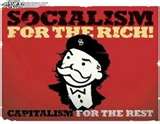 The topic for today is something called crony capitalism which is destroying free enterprise. The basic idea of capitalism is that free markets provide the best economic model for the growth of a nation. There are a lot variables within capitalism but at its most fundamental it is an idea that includes private ownership and production, wages for workers, free competition, and accumulation of capital for profit.
The topic for today is something called crony capitalism which is destroying free enterprise. The basic idea of capitalism is that free markets provide the best economic model for the growth of a nation. There are a lot variables within capitalism but at its most fundamental it is an idea that includes private ownership and production, wages for workers, free competition, and accumulation of capital for profit.
The ideas of capitalism are probably good fodder for another blog. What I want to discuss today is how crony capitalism is destroying the free market and with it our libertarian ideals. While crony capitalism has the word capitalism within it, it is actually a form of socialism, or government control of industry. Socialism is another badly misunderstood word and I should take that up in another blog. The ideas keep rolling in!
What is largely meant by this term is not capitalism at all. The United States government has become overly involved in the success of business. It is through government involvement that a particular product or service now succeeds. This has spawned an entire industry of lobbyist who spend their days trying to convince government officials to pass laws, regulations, and make actual purchases that favor their employer.
Most people see this problem with the U.S. military and decisions on which system to purchase are often decided by factors other than the actual effectiveness of the product.
However, this crony capitalism extends much deeper into society than most people realize. Go ask your employer if you have any government contracts. Ask them how much of the company money is spent on trying to get government agents to give them advantages.
There are a lot of reasons to fear this subversion of true capitalism but I think the main idea goes back to what Ayn Rand suggests in her writing. That the individual achiever must be allowed to succeed or society as a whole will eventually fail. The problem with crony capitalism, from my perspective at least, is that companies and individuals achieve not on the merit of their work but upon their ability to bribe government officials into altering the playing field so that they succeed. This eventually means companies that are good at bribery and backstabbing succeed while companies that just want to make a good product, employ hard workers, pay them a good salary, and make some money are defeated.
Again, we arrive at the point where I’ve complained all day long and not offered any solutions to the problem.
This is an extremely difficult problem but at its heart it comes down to fairness of government regulation. I’m a relatively moderate Libertarian in that I believe government regulation is necessary to prevent anti-trust situations but these regulations need to be broad and aimed at creating a fair playing field for all businesses.
It’s not easy to come up with legislation of this sort but I’ll take on food labeling as an example of my ideas. There are currently a bevy of regulations on how to display the nutritional contents of food. The problem is in defining what percent of a particular nutrient applies to a wide variety of people and what defines a serving size. It seems clear to me that nothing is going to be applicable to someone of my size, 5 foot 7 inches (1.7 meters) 165 lbs (74.8 kg) of twisted steel, and say, the left tackle of the St. Louis Rams. Go Rams!
So, why not simply put in the actual nutritional value of the entire package on the label. I can figure out how much of the package I eat, I can easily find out the daily allowances for someone of my size. It’s not the governments job to lead me to the water and hold my hand while I drink.
Another example might be the animal husbandry industry. Simply make the producer put a webcam on their livestock and slaughtering pens and make it publicly available. If I know how the animal is treated then it is up to me if I want to save a little money or purchase the more expensive, but better treated, animal.
I’m a believer that government needs to regulate but the purpose is to create a fair playing field so that the best business can succeed, which is a winning formula for you and me.
Tom Liberman
